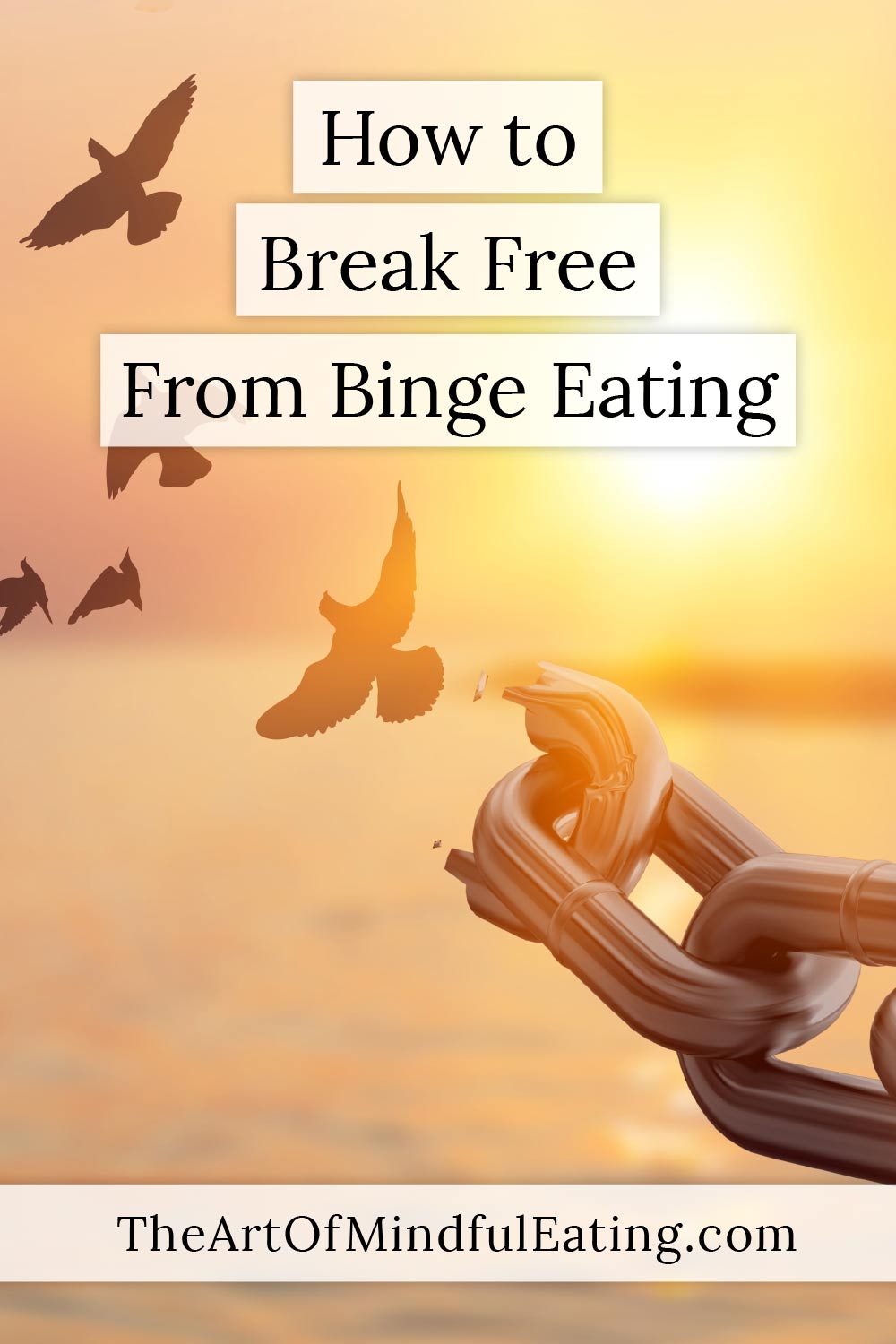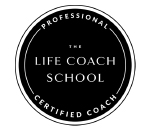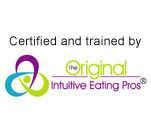How to Break Free From Binge Eating

Filed Under: Binge Eating
9 February 2024 | Written by Xenia Ayiotis

“I’m at rock bottom again and I feel helpless and hopeless.”
I saw that somebody had written this on a Facebook page just a few days ago. It’s a feeling many of us who struggle with binge eating know all too well. The overwhelming shame, guilt, and physical discomfort that come with bingeing can make us feel like we’re stuck in a never-ending cycle of self-destructive behaviour. But it doesn’t have to be this way.
Binge eating is a complex issue that affects millions of people all over the world. It’s a behaviour that can be triggered by various factors, such as deprivation, stress, anxiety, depression, or a history of trauma. But regardless of the reasons, it’s essential to understand that binge eating is not a lack of willpower or a character flaw. It’s a condition that requires compassion, understanding and support.
So, why do we binge? There are five main reasons.
1. Emotional Triggers: Often, we use food as a way to cope with difficult emotions such as stress, sadness, or loneliness. Binge eating can provide temporary relief from these feelings, but it also creates a vicious cycle of shame and guilt, leading to more bingeing.
2. Restrictive Eating: Restrictive eating patterns can trigger binge eating. When we deprive ourselves of certain foods or food groups, we may feel a sense of deprivation that can lead to overeating or bingeing.
3. Low Self-Esteem: Poor body image and low sense of self-worth can also lead to binge eating. We may use food as a way to numb our emotions or avoid dealing with underlying issues related to self-worth.
4. Social Pressure: Social pressure to conform to certain body standards can also trigger binge eating. The media’s portrayal of the “ideal” body and the pressure to fit in can lead to dysfunctional eating patterns.
5. Biology: Some people may be predisposed to binge eating due to genetic or hormonal factors. Research has shown that individuals with binge eating disorder have differences in brain chemistry that can affect their appetite regulation and impulse control.
How can we break free from the cycle of binge eating?
Perhaps the idea of breaking completely free of binge eating is a bit ambitious because if eating has been your coping tool for many years, it will most likely remain to a certain degree – especially in times of vulnerability. I like to encourage my clients to aim for reduced binge eating – in frequency and quantity.
1. Mindfulness: Mindful eating is a practice that helps you tune into your body’s hunger and fullness signals. It involves paying attention to the taste, texture, and aroma of food. It also involves being aware of your emotions and your thoughts. This self-awareness coupled with action and self-compassion can prevent binge eating or interrupt it.
2. Challenge Your Thoughts: Negative self-talk and self-criticism often fuels binge eating. Challenge your thoughts and beliefs about food, body image, and self-worth. Be aware of negative self-talk and respond with kindness reminding yourself that thoughts are just thoughts and not necessarily facts.
3. Build a Support System: Seeking help and support from a therapist or coach experienced in binge eating. A therapist or coach can help you identify the underlying triggers or your unmet needs and you can create a personalised plan to address your specific needs. Group support can help you feel less alone in your struggle with binge eating, it’s useful to connect with others who understand what you’re going through.
4. Give Yourself Permission to Cope by Eating: I know this sounds counterintuitive but having a rule around not binge eating in itself can trigger more binge eating. Allowing yourself to binge if you need to and to do it in a conscious way by becoming aware of your triggers, naming them, accepting that you are going to binge to cope and treating yourself kindly afterwards. This reduces the shame. We cannot heal our relationship with food by blaming and shaming ourselves.
5. Add Other Coping Tools to Your Toolbox: In addition to using food to cope with difficult emotions, find additional coping mechanisms that work for you. Walking, journaling, meditation, or spending time in nature are all alternative ways to manage stress and anxiety.
For many people who struggle with binge eating, it can be a scary and isolating experience, but it doesn’t have to be a lifelong struggle. By understanding the underlying reasons for binge eating and seeking support, it’s possible for some people to break free from this cycle, for others to reduce the frequency and reclaim a more peaceful relationship with food.
Remember, you are not alone, and there is always hope. It’s possible to create freedom and peace with food.
Wishing you peace,
Xen
✨ Ready to get coaching around changing your relationship with food? Book a free 30-minute mini session and let’s explore what challenges you’re facing and see how the coaching and courses I offer can support you.
PS. I’m sharing a wonderful client testimonial I received recently:
“When I found Xen I felt defeated and was at a “dieting bottom” I had recently stumbled upon this thing called intuitive eating when trying to find the next “thing” that will work this time. I was skeptical at first because I’ve been told my whole life you need to be a certain size or else others will think you are not doing well in life. Thanks to Xen I have learned it is okay to have a different body than others and learning body positivity. I am more than a number on the scale and truly feel it through the one on one sessions as well as the group one I attended. She has helped me recognize that conditioned “diety thinking” and other behaviors that have not been serving me. It feels so freeing to not have the pressure of the scale any longer.”
– Alyssa Kullman, Simi Valley, CA –
You might also be interested in blogs about:
“Words can not describe how Xen changed my life! She freed me from being a prisoner of food because food controlled every aspect of my life since I was a child. I abused my body in so many ways from starving myself, eating to the point of feeling sick to my stomach and using exercise to punish myself for the amount of food I had eaten. Xen also taught me to be kind to myself, to be patient with myself and most of all to forgive myself. She helped me to build a healthier relationship with food and my body image. Xen was patient, kind and listened to what I had to say. Her audio lessons and reading material on her online courses and her youtube channel also helped me enormously in this process. She helped me to live the life I was meant to live and I now look at everything in life (not just food) through a different lens!”
“From our first meeting - two faces on Zoom across the world from each other, there was a sense of familiarity and comfort that was a healing balm for a lifetime of food struggles and dieting. Without realizing how much damage I had done to myself by adhering, for decades, to restrictive food plans and rigid diet programs, Xen had a way of redirecting the harsh and negative self-talk and sending me forth each week with compassion, mindfulness and a new way of seeing myself in the here and now. Gone are the maybe somedays, and if-only, and when-I’m-smaller thinking. Now I am committed to the imperfect and rocky path to listening to my body, accepting my perfect imperfections, and rejecting diet mentality. Those negative voices will revisit me from time to time, I know, but Xen has offered valuable tools for meeting each day as a fresh start - another choice, another chance. Her devotion to this work and her belief in her clients is a remarkable gift; I am so fortunate to have found her. It is never too late to let go of the drama and embrace joy, ease and self-acceptance.”
“I felt hopeless and helpless in my daily struggle with mindless eating for many years. Then I found Xen which is exactly what I needed! My decision to work with her helped me to finally repair my relationship with food. It's changing my life for the better, one day at a time. Now I have control over the food, instead of it having control over me, which is the way it should be. I highly recommend Xen to anyone who has a desire to overcome similar food struggles. Xen, thank you from the bottom of my heart!”
“I reached out to Xenia because 2021 started on a tumultuous note for me. Between deaths, businesses suffering, hospitalizations, and job losses in our personal circle, I felt depleted and found myself being available for everyone but myself. Then I was hit with an unexpected health diagnosis, which was the last straw as it meant giving up “healthy foods” and workouts that I leaned on for my well-being and stability. Despite working in wellness (Yes, coaches and healers are vulnerable too!), I found myself reaching out to desserts for comfort. I like to live a life of permissions (not labels or deprivation leading to bingeing), so I wanted to work with someone who approached healing from a place of mindful compassion. I didn’t want to be my own client. Xenia was great in reminding me to be kind to myself. Working with her, brought me peace and helped shift my mindset. I love how desserts and I look at each other now.”
“Working with Xenia was amazing. She armed me with a bunch of tools to help me through difficult times. Xenia is the kind of person who really cares for helping you in the long run. Her work will forever have an impact in my life.”
“Working with Xen was a game changer for me. After working together for a few months my relationship with food radically changed. I no longer felt like a failure. I now have the tools to nourish my body with foods that feel good in my body. I don’t feel guilty about eating cake or chocolate, I also don’t overeat cake and chocolate. I no longer feel the need to exercise to compensate for my eating. I feel much more free around eating and I am more accepting of my body. Xen has a nonjudgmental and compassionate approach to coaching and really supports you in the process.”
“Working with Xen has been very empowering. Her approach is so refreshing from the usual. I have learned that I am in charge and that I get to choose what I put in my body and how to move my body in a way that I like! I get to make my own choices. It’s so liberating. Once you get a taste of freedom with food, there is no turning back to old ways! Thanks Xen for guiding me along the way to freedom.”
“This is the answer for those of you that struggle with food and all that surrounds it. Xenia said that I could make peace with food and it seemed at the time like an impossible dream. Turns out it isn’t. I recommend Xen and the mindful eating / intuitive eating approach unreservedly. If you have any questions about my experience, please get in touch. Thank you Xen. My rating: ⭐⭐⭐⭐⭐”
“Xenia was a walking, living, breathing example of what can be done. I laughed and cried my way through a short course in this fascinating and invigorating programme with her, and have gained a designer tote full of coping skills that go way beyond containing kilogrammes. I feel infinitely lighter. I am doing this for me and, yes, you can do this for you too! And believe me, I’m cynical!”
“I don’t obsess about food like I used to. I am thinking differently about food and feeling so much more relaxed around all types of food. It’s wonderful to have pleasure and satisfaction from eating.”
“I learned a new way of thinking about food. I have learned that food is not the enemy and that it can actually be enjoyed with no guilt.”




